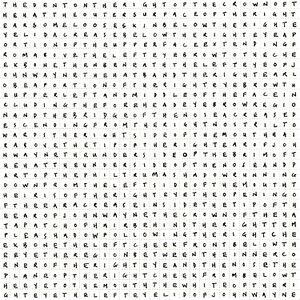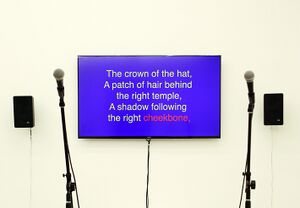Portrait of John Wayne


Lyrics
The dent on the right of the crown of the hat, The outer surface of the right ear, Some loose skin below the right eyelid, A crease below the right eye, A portion of the upper face Extending from above the left eyebrow To the cheekbone Then beneath the left eye Of John Wayne.
The hat band, The right earlobe, A portion of the right eyebrow, The upper left and middle of the face Including the forehead, Eyebrow region and the bridge of the nose, A crease descending from the right nostril Towards the right of his mouth, Hair above the tip of the right ear Of John Wayne.
The underside of the brim of the hat, The underside of the nose and part of the philtrum, A shadow running down From the left side of the mouth, The iris of the right eye, The opening of the ear, A crease inside the tip of the ear Of John Wayne.
The crown of the hat, A patch of hair behind the right temple, A shadow following the right cheekbone, The left cheek front below the eye, The region between the inner corner Of the right eye and the nose Of John Wayne.
A region of the head from the right temple sideburn The lower lip A portion of the face extending from the middle left cheek and chin And rightwards along the jaw line The left sideburn The right eyelid of John Wayne.
The frontal planes of the right side of the face Rising leftward to the tip of the nose A crease running from the inner corner of the left eye Under the ? The left eyelid A crease ? of the opening of the right ear Of John Wayne.
A shadow below the right side of the right eyebrow The white of the left eye A depression between the left eye and the nose A crease above and leftward of the left eyelid The right side of the upper lip A depression at the upper left of the crown of the hat Of John Wayne.
Chronology
 Five American Portraits
Five American Portraits - Mayo Thompson - vocals
- Gina Birch - vocals
Retrospectives
Mayo Thompson, 2010[2]
[...] with John Wayne, I grew up with John Wayne in the movie house. Back in the day in Houston, there used to be a theater on the corner of Main Street and Richmond Avenue that was called the Delman. I lived around the corner from that theater, and I used to go there every Saturday to the movies. I think I probably saw most of the movies that John Wayne was in from the late '40s all the way through the '50s.
John Wayne was a hero to me. He's one of those figures that I just admired and respected. And of course in the '60s, when there was a question of are you a patriot and how does patriotism express itself, and there was some controversy over what counted as a legitimate expression of patriotism and 'Do you love your country?' and 'Would you die for it?', etc. The Green Berets, and all that moment. And John Wayne had always been a conviction player on the side of flying the flag, which is something I understand.
Of course my father's generation, those people went out and fought the war. That was the world I grew up in. I was born in '44, the war ended a year later, no connection I'm sure, but that colored my relationship to John Wayne. [...]
The John Wayne thing, the movie, one of my favorites of his is The Searchers. It's got music by Max Steiner. I think he must be a German émigré who came to America after the war, somebody like Franz Waxman, who wrote for Hitchcock, somebody who was trained in the academy and knew musical tropes very well, and who was able to adapt things, sitting out there in Hollywood and knew this one and knew that one, and one thing led to another and pretty soon he's writing the music to this movie.
So because it's a Western, he's obliged to bring it down to earth at some level, and there's some fairly prosaic music, and I'm sure that he listened to some American music in the same way that, you know, Bartok listened to folk music and stuff like that. When I listened to The Searchers, I thought, 'Well, there's 'Just a Closer Walk With Thee' in there, it's an adaptation from this old spiritual, but it's also the tune to a thousand songs.' So it's deeply ingrained in American culture, and so it seemed to me to be deeply noncontroversial.
Plus, in that setting, you have all the chromatic excitement, which is all the clichés of soundtrack music versus this homely tune, and that kind of thinking.
Interpretations
- Musical reference listed on the back of the record:
- "The Searchers" (music by Max Steiner)
- cf. "Just a Closer Walk With Thee" (D. Gillis) and "Dixie's Land" (Daniel Decatur Emmett)